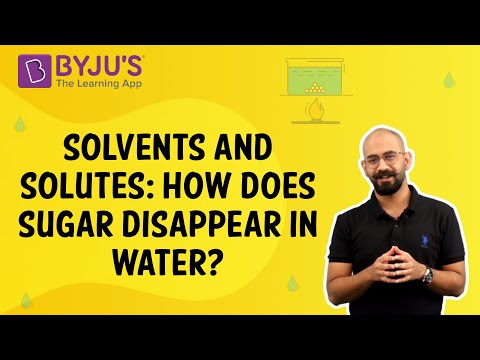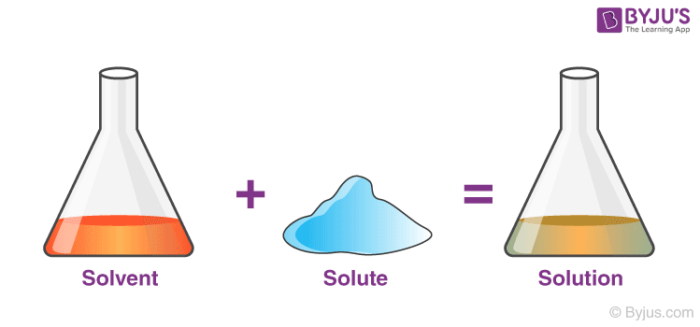What is Solute?
A substance that is dissolved in a solution is called a solute.
In fluid solutions, the amount of solvent present is greater than the amount of solute. One best example of solute in our day to day activity is salt and water. Salt dissolves in water and therefore, salt is the solute.
Table of Contents
- Recommended Videos
- Characteristics of Solute
- Types of Solute
- Solute Examples
- Frequently Asked Questions – FAQs
Recommended Videos

A homogeneous mixture composed of two or more substances, in which a mixture, a solute is a substance dissolved in another substance known as a solvent. The concentration of a solute in a solution is a measure of how much of that solute is dissolved in the solvent, with regard to how much solvent is present like salt.
Characteristics of Solute
- A solution is a homogeneous mixture of two or more substances.
- The particles of solute in a solution cannot be seen by the naked eye.
- A solution does not allow beams of light to scatter.
- A solution is stable.
- The solute from a solution cannot be separated by filtration (or mechanically).
- It is composed of only one phase.
To Know About Solvents And Solutes, Watch The Below Video:

Types of Solute
Homogeneous means that the components of the mixture form a single phase. Heterogeneous means that the components of the mixture are of different phase.
The properties of the mixture including concentration, temperature, and density can be uniformly distributed through the volume but only in the absence of diffusion phenomena or after their completion. The major types of solute are:
- Gaseous
- Liquid
- Solid
-
Gaseous:
Gaseous Solute can be dissolved in Gas, Liquid and Solid solvents. For example-
Gas in Gas – We know that Nitrogen has the greatest composition (78%) in the air. Therefore oxygen and other gases are solutes, Nitrogen is the solvent and air is the solution.
Gas in liquid- Oxygen in water and Carbon dioxide in water are such examples.
Gas in Solid- Hydrogen dissolves rather well in metals, especially in palladium. Hydrogen is the solute here.
-
Liquid:
If the solute is a liquid, then it can be dissolved in liquids, and solids. Here are some examples:
Liquid in liquid- Here both solute and solvent are mixed their liquid form. Alcoholic beverages are basically solutions of ethanol in water.
Liquid in Solid- Mercury in gold, forming an amalgam. Water in solid salt or sugar forming moist solids, Hexane in paraffin wax
Note: Gaseous Solvent cannot hold liquid solute so there is no Liquid in Gas solution.
-
Solid:
A solid solute can be dissolved into a liquid or a solid solvent. For example-
Solid in liquid- Sucrose (sugar) in water
Sodium chloride (NaCl) (salt) in water.
Solid in solid- Steel, basically a solution of carbon atoms in a crystalline matrix of iron atoms.
Alloys like bronze and many others.
Polymers containing plasticizers.
Note: A solid- gas solution is not possible because uniform or homogeneous composition can never be achieved.
Solute Examples
The solute examples are listed below with the corresponding solution.
| Solutions | Corresponding solute in the solution |
| Brass alloy | Zinc in copper |
| Amalgam | Mercury in silver |
| Antifreeze in radiator | Ethylene glycol in water |
| Carbonated beverages | CO2 in water |
| Air in atmosphere | Many gases in nitrogen |
| Bronze | Tin dissolved in copper |
| Sugar water | Sugar dissolved in water |
| Alcoholic drinks | Alcohol dissolved in water |
| Saltwater | Salt dissolved in water |
Saturated and Unsaturated solution
When a solution dissolves solute as much as possible at a particular temperature, is called a saturated solution. In simple terms, it can also be defined as, at a given temperature when no more solute can dissolve itself in the solution, it is a saturated solution. When the quantity of solute is not as same as the saturation level but less than that, it is known as an unsaturated solution.
Frequently Asked Questions – FAQs
What is considered a solute?
A solute is typically a solid dissolved into a liquid. Salt is the solute that dissolves to form a saline solution in water, the solvent. On the other hand, water vapour is considered an air solute because nitrogen and oxygen are present in the gas at much higher levels of concentration.
What is a universal solvent?
Water is considered the universal solvent because more compounds are dissolved into it than any other solvent.
Is water a solute or a solution?
Two substances that are evenly mixed together are basically a simple solution. One is called the base, and the other is the solvent. A solution is a dissolving material (sugar). The solvent is the one that dissolves (water).
What is the difference between solute and solvent?
A solute is the one which is lesser in amount than the solvent and both together form a solution. For example- If 1 spoon of copper sulphate dissolved in 1 liter of water then copper sulphate would be the solute and water is the solvent here. Hence, the major difference between them is of amount available in the solution.
What are the properties of solute?
Properties of solute of a solution-
The particles of solute in a solution cannot be seen by the naked eye.
The solute from a solution cannot be separated by filtration (or mechanically).
A solution does not allow beams of light to scatter because the solute is dissolved in the solution uniformly and they very small in size unlike colloide particles they do not scatter light, hence light pass through the solution without scattering.
Read more:


Muja class ,6 solution, solvent, solute
Click here to learn about the Solution